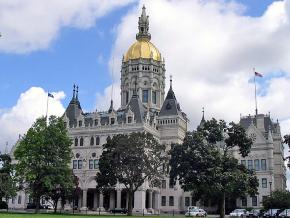Let’s tax Connecticut’s rich again
Connecticut teacher says the rich need to start paying their fair share.
PUBLIC SCHOOL teachers in Griswold, Connecticut, recently organized a meeting with local legislators concerning cuts to state funding for public education. These legislators, both Republicans, blamed the budget crisis on the costs of state employee and retiree benefits and teacher retirement funds — which teachers are required to pay into because they aren’t eligible for Social Security.
In response, one teacher asked the question, “If Connecticut is in such a crisis, why is the legislature and governor considering a proposal to completely repeal the estate tax?”
The estate tax affects only the state’s richest residents. Until Gov. Dannel Malloy signed a budget last year that expanded the personal exemption, the estate tax had ranged from 7.2 percent for estates over $2 million to 12 percent for estates over $10.1 million. In 2017, it was estimated that the state made $174.6 million from the estate tax.
By comparison, the total amount of state funding cut from schools for the current school year is $90 million.

At the meeting with teachers, one of the legislators, state Sen. Heather Somers, justified the elimination of the estate tax, stating that the amount collected from this tax has been diminishing from year to year.
This is hardly a convincing argument to surrender tens of millions of dollars in the middle of a funding “crisis.” But the real issue, according to Somers, is that “if you tax the rich, they will leave Connecticut.” Somers says the rich already are leaving. This isn’t true.
State taxes on the wealthiest households have not resulted in an exodus of millionaires. On the contrary, from 2010 to 2017, the number of millionaires living in Connecticut increased by about 17,000. By 2017, Connecticut ranked third in millionaires per capita, with a total of 106,892. Furthermore, 17 billionaires remain living in the state.
While it is certainly the case that the rich have the means to be more mobile, the argument that the rich will necessarily leave if they are taxed overlooks something that keeps businesses in place: large business and state investments in infrastructure that can’t simply be discarded without huge losses in profits.
In his recent book On New Terrain, Kim Moody explains what keeps businesses from moving from place to place on a whim:
It’s all very fine that due to “financialization,” capital in its money form flies around the earth at the speed of light, but once the “buck” has landed and is transformed into roads, rails, ports, warehouses, factories, communication systems, equipment, and the like, these investments don’t just get up and walk away...
From 1998 to 2014, new capital investments in structures amounted to $658 billion in manufacturing, just over $200 billion in warehouses, and $150 billion in transportation. According to the BEA, the average life of a manufacturing facility is 31 years, while that of a warehouse is 40 years, and that for air and “other” transportation structures 38 years.
Furthermore, the argument that “if you tax the rich they will leave” amounts to what Australian socialist Mick Armstrong has called the “blackmail” of working people by the wealthy, who are able to hide their wealth in offshore accounts.
In our society, working people don’t have the ability to dodge taxes. What if working people were to collectively not pay regressive taxes and protest through a strike? The government would intervene and enforce an end to the strike in order to get their money.
This exposes the social class nature of our tax system which disproportionately taxes working people compared to the rich.
THE MESSAGE coming from the state of Connecticut and its legislators is that working people should pay for a crisis they didn’t create.
The state government currently is entertaining a plan advocated by the Connecticut Commission of Fiscal Stability and Economic Growth” to mitigate the budget crisis by passing a number of tax measures that, when taken together, amount to regressive taxes on working people.
The repeal of the estate tax is part of this plan. To make up for the loss in revenue from the elimination of this tax and the proposed decrease in personal income taxes on the wealthiest households, the state is considering increases in sales taxes, like on gas.
Although their plan involves some increases in payroll taxes on Connecticut’s larger businesses, any gains from this tax are offset by the larger regressive measures, and are coupled with demanding future concessions from teachers and state employees over their retirement benefits.
Teachers began paying another regressive tax last year when the Connecticut legislature agreed to pass what is known popularly as the “teacher tax.” Starting in January of this year, teachers began paying an extra 1 percent of their pay toward their retirement. This amounts to an extra 16 percent contribution to the fund, coupled with a corresponding decrease in the state’s contribution.
When a teacher in the meeting at Griswold brought this up, the other legislator, Rep. Kevin Skulcyzck, denied that this was a “tax.” He trivialized it with an anecdote about his wife, who is a teacher, supposedly reminding him all the time that the 1 percent increase amounts to a $40 reduction in her paycheck — the cost of getting her nails done.
In the coming years, understanding the nature of a tax system that favors the rich and organizing against tax measures that disproportionately affect working people are going to be necessary to defend public education funding and other social services on which so many working and poor people rely.


